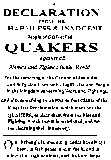 After the Restoration of the Monarchy in England, Quakers were suspected along with the Fifth Monarchy Men,
of plotting against King Charles II. To refute this false accusation, they published this declaration
on 21 January 1661.
After the Restoration of the Monarchy in England, Quakers were suspected along with the Fifth Monarchy Men,
of plotting against King Charles II. To refute this false accusation, they published this declaration
on 21 January 1661."We know that wars and fightings proceed from the lusts of men (as James iv. 1-3), out of which lusts the Lord hath redeemed us, and so out of the occasion of war...."
"That the spirit of Christ, by which we are guided, is not changeable, so as once to command us from a thing as evil and again to move unto it; and we do certainly know, and so testify to the world, that the spirit of Christ, which leads us into all Truth, will never move us to fight and war against any man with outward weapons, neither for the kingdom of Christ, nor for the kingdoms of this world."
- from A Declaration from the Harmless and Innocent People of God, Called Quakers, 1661.
"I told them I knew whence all wars arose, even from the lusts, according to James's doctrine, and that I lived in the virture of that life and power that took away the occasion of all wars."
- Autobiography of George Fox, Chapter IV, A Year in Derby Prison, 1650-51
 "While someone lives, there is always the hope of reaching that of God within them: such hope motivates
our search to find nonviolent resolution of conflict.
"While someone lives, there is always the hope of reaching that of God within them: such hope motivates
our search to find nonviolent resolution of conflict."Peacemakers are also empowered by that of God in them. Our individual human skills, courage, endurance, and wisdom are vastly augmented by the power of the loving Spirit that connects all people.
"Refusal to fight with weapons is not surrender. We are not passive when threatened by the greedy, the cruel, the tyrant, the unjust.
"We will struggle to remove the causes of impasse and confrontation by every means of nonviolent resistance available.
"There is no guarantee that our resistance will be any more successful or any less risky than military tactics. At least our means will be suited to our end....
- from Statement on Peace , New Zealand (Quaker) Yearly Meeting, January 1987